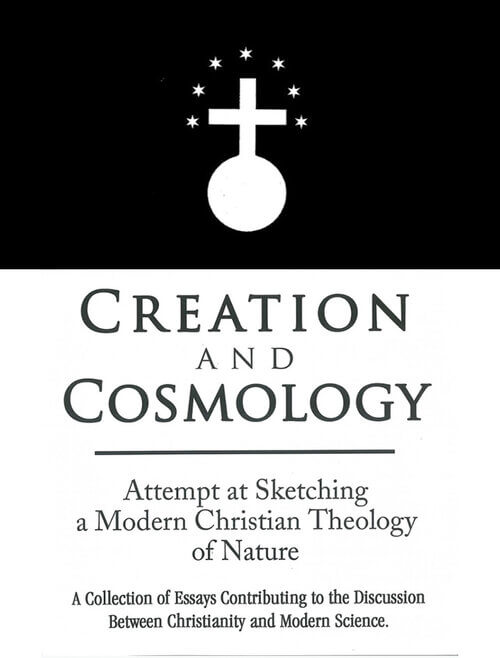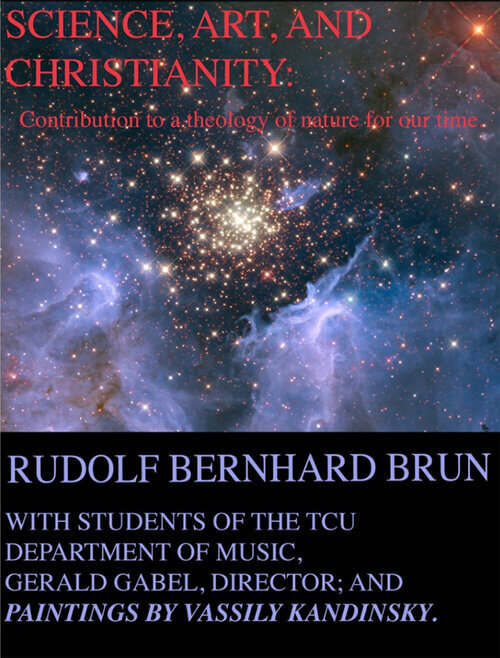BOOKS Creation and Cosmology & Science, Art and Christianity
Reviews
REVIEW BY KIRKUS DISCOVERIES
“A brief work that argues for the synthesis of Christian faith and scientific discovery.
Brun (Creation and Cosmology, 2009) attempts to square the circle of Stephen Jay Gould’s famous “non-overlapping magisteria”: the worlds of religion and science. He does so with intellectual rigor and a surprising amount of success, beginning with some fairly large ideological conceptions: “Any serious discussion between Christian theology and science must accept that nature is free to become itself,” he writes. “This is to say that there is no interference from supernatural entities into the natural creative process.” Modern physics, he observes, has demonstrated that physical laws are the results of the natural process, not the superimposed dictations of a “super-nature.” Brun’s view, which draws on the work of the famous Jesuit theologian Pierre Teilhard de Chardin, is that nature is the result of God’s Word, but it is also “free to become itself” without interference from supernatural forces, and that human science is also free to explore it. The author may run into trouble with more doctrinaire readers, not only for flatly declaring that all religions are human inventions, but also for exploring beliefs regarding God’s limitations; Panentheism, he says, believes that God is good and encourages good, but “cannot prevent evil from happening.” He also champions the notion of what he calls “syntheses” of the natural and the spiritual world, typified by the human drive to produce classical music or paintings, for example; the author’s side-discussion of the work of painter Wassily Kandinsky is quite engaging. Despite some distracting typos, the book’s arguments are persuasive. Ultimately, it asserts what many others have hopefully asserted before: that religion and scientific inquiry are only enemies when they’re being shortsighted: “Christianity has always adhered to the notion that faith must seek understanding,” Brun writes. “Therefore, Christian faith cannot ignore the understandings gained by science.”
A slim but powerful entry in the long-running debate between science and religion.
https://www.kirkusreviews.com/book-reviews/rudolf-b-brun/science-art-and-christianity/
---
REVIEW BY John F. Haught, Ph. D. Senior Fellow, Science & Religion
“A learned effort at the seemingly impossible—reconciling the central claims of science with the basic truths of Christianity. As the 19th century’s scientific revolution exploded into the unprecedented developments of the 20th, christian believers were forced, in more dramatic ways, to square new science— evolution, quantum physics, relativity—with long-held spiritual beliefs. As the modern age grew ever more modern, many believed that the putative disparities between science and religion forced individuals to choose one of the two. In his new collection of very erudite (if not always accessible) essays, Brun suggests that the faithful need not make that choice—that a third solution can split the difference between science and religion and allow us to use the tools of the former to see god in nature. Much to his credit, he does not cut corners, wisely avoiding the pseudo-scientific—and ultimately false—claims put forth by inexact amalgamations like the so-called “creation science” or the more recently discredited “intelligent design.” These schools of thought merely gravitate toward the inevitable gaps in scientific knowledge and shoehorn the divine into them. To this issue the author sharply writes, “it would be foolish indeed to again argue for a god of the gaps!” It would be equally foolish to try to hastily summarize Brun’s intricate arguments regarding the “theology of nature.” Suffice it to say that his reasoning only periodically works, but his writing is intellectually honest and spiritually daring. As familiar with hard science as he is with complex theologies, he brings an exacting mind to a daunting task and leaves readers the wiser. A remarkable, thorough collection of academic essays.”
---
REVIEW BY C. David Grant, Professor of Theology
“Rudolf Brun is a rarity in the modern academy. A developmental biologist retired from years of research and teaching at Texas Christian University, he studied as a young scholar with the significant Catholic thinker Hans Urs von Balthasar and sat in on lectures of Karl Barth. Thus, from his earliest education he has had the heart and soul of a Christian intellectual, seeking to make sense of his experimental work in biology in a larger context. He has devoted his time since retirement at working out a Christian understanding of cosmology, the results of which are contained in his new book, “Creation and Cosmology.” Brun takes utterly seriously that science describes cosmology as being fully explainable as the product of natural laws: Brun’s God is no intervening deity in the process of nature. But rather than conclude therefore that God does not exist, Brun sees this as an affirmation of the fundamental Christian affirmation that God is love: God so loved creation that God gave creation freedom to create itself, apart from God. Only in this way, says Brun, can creatures have the freedom to truly love God in return. As is evident from his references to Hegel, Descartes, and Hume—and to Augustine, Thomas Aquinas, and Bonaventure—to name a few, Brun works his way through philosophical and theological texts as he weaves his position together. Not all will agree with Brun’s conclusions and the way that he holds a radically naturalistic view of creation together with a traditionally orthodox notion of Scripture and Christology. Nonetheless, it is a worthwhile trek to follow his argument along to see the way that one steeped in science, theology, and philosophy constructs a view of religion and science today that tries to take all three equally seriously.”

"CREATION AND COSMOLOGY" A COLLECTION OF ARTICLES PUBLISHED BY RUDOLF BRUN IN "COMMUNIO, INTERNATIONAL CATHOLIC REVIEW" AND "ZYGON, J. OF RELIGION AND SCIENCE."
CONTENT
“God is love” is the fundamental revelation of Christianity. From this foundation, it follows that creation is God’s gift. What precisely is this gift? The first chapter of Genesis makes clear that it is the Word of God that creates creation: God speaks, and the world becomes. This is confirmed in multiple passages of the New Testament, e.g., in the prologue to John’s gospel and in the epistles of Paul. What does it mean to say: the Word of God creates creation? The Word of God is God, the second person of the Trinity, Jesus Christ. How can the Word of God that is God create creation that is not God? Can God be God in that which is not God? The answer from Christianity is, “yes! Yes, because God proves in the Christmas event that he can be God in that which is not God but a human being. In Jesus Christ, the Word of God that is God becomes a human being that which certainly is not God. God’s logic of incarnation surpasses our understanding that something cannot be that, which it is not. From the perspective that the Word of God is the gift of God to creation, one may be able to see that this gift now belongs to creation; it is God’s gift truly given away and also truly received. As a consequence, the creative Word of God now belongs to creation- no strings attached. It is because this gift of God now belongs to creation that creation is capable of freely becoming itself. This, however, is precisely what modern science has discovered, that nature is capable of becoming itself. Therefore, modern cosmology only makes explicit what is already implied in the fundamental Christian revelation that God is love.
Price
$ 3.99
Download Google Books App
Download Amazon Kindle App

THAT GOD IS LOVE IS THE FUNDAMENTAL REVELATION OF CHRISTIANITY. THEREFORE, CREATION MUST BE GOD'S GIFT.
BOOK SUMMARY
What precisely is this gift? The gift is the Word of God that brings forth creation: God speaks, and creation becomes (Genesis 1). This Word of God is God, but it brings forth creation, that which is essentially not God.
God is existence, but He gives His Word away, to that which is "n0-existence," to that which is "n0-thing." Because God gives His Word away to that which is nothing, God's Word departs from God and becomes the creative center of some-thing, of creation. This creative center belongs to creation because God gives His creative Word away. The creative Word of God that is God becomes the creative center of creation; it becomes the nature of nature. As a consequence, nature is capable of becoming itself. This Independence of creation from God is an absolute requirement. This because any loving relationship between God and human beings, the representatives of creation (St. Paul), requires the freedom of God and Men to either accept or reject such a relationship. The freedom of creation to become itself is therefore rooted in the Christian revelation that God is love; that nature is capable of becoming itself is also the main result of modern science.
The creative process:
Nature brings forth novelties from “matter” to consciousness and from there self-consciousness in human beings. Mind emerged like anything else in the universe through the essentially historical (probabilistic) process of general evolution.
Throughout the entire universe, it is the unification of diversity into a unity that brings forth new existence. It is the old insight that all existence depends on being united into one. Unification of diversity (quantitative or qualitative) into unity brings forth new existence. This has been described as the Gestalt phenomenon, that the whole is more, quantitatively and qualitatively than its parts. Actually, this basic phenomenon is now better known as the phenomenon of emergence; synthesis brings forth emergent novelties.
Synthesis, however, is creative not only in nature but also in art. In the present writing, this is illustrated with two examples, one from the history of music, from Gregorian chants to J.S. Bach, the other from the life history of the painter Vasilly Kandinsky.
Synthesis, the unification of diversity into unity, brings forth new existence universally. This ontological structure of all created being is interpreted as the watermark of the Triune Word of God in the absolute difference of creation.
Therefore, the thesis of this booklet is that God can be God in that which is not God. The eyes of faith can see this illogicality also in the Eucharist and in the Christmas event. There too, God proves that he can be God in that, which is not God; in the Eucharist bread and wine, and a human being in the mystery of Christmas. For our logic, something cannot be that, which it is not; but this is no obstacle for God’s logic of incarnation.
Art:
The E-book “Science, Art, and Christianity” also presents Dr. Gerald Gabel, TCU, Department of Music. Dr. Gabel traces the history of Music, from Gregorian Chants to the Baroque. The examples illustrate how sequential syntheses brings forth novelty in musical compositions. There is an analogy between the emergence of novelty in music and nature.
Price
$ 4.99
Download iBooks App